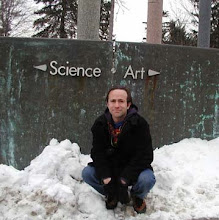NECESSITY: Azi spoke of being an engineering student and told to "create needs for people" in the form of products that they could then build. This reminded me of some past writing and the words of George Basalla. In his book, "The Evolution of Technology," he wrote how the invention of an idea gives birth to the necessity to make use of it. In other words, it's not that necessity is the mother of invention - it's the other way around. Most inventions serve no obvious purpose when invented - afterwards, however, a need is created to ensure that invention's survival.
On that note - from a headline in The Onion from way back: "Consumer-product diversity now exceeds biodiversity."
LANGUAGE: Also in class, we talked about systems that we are a part of, systems that have been with us for so long, they seem as if natural, it's impossible to imagine being outside of them. (I go into this with my Metropolis essay on Time.) I suggested language as a trap. We'll stay clear of memetics this time around, but we can think of language as abstraction of reality, as distancing us from our reality. Magritte presented it best with his image of a pipe and the caption "this is not a pipe. (Well, actually it was in French, which is a whole other issue.) Steven Pinker states that through the use of language, "we can shape events in each other's brains with exquisite precision." This speaks to being forced to use the language of the oppressor - what if language itself is the oppressor? One more quote, Rollo May wrote, "It is not that language is merely a tool of communication, or that we only use language to express our ideas; it is just as true that language uses us." (The Courage to Create, 85.)
I'll round out the Language thoughts with two passages from Alan Moore. In "Big Numbers", after an episode of swearing by one passenger on a train, an elderly man across the cabin says, "There's no need for language." A slip of the tongue? Or pointing to something deeper perhaps?
In "The Birth Caul," Moore takes us back in time with his character, slowly spiralling towards childhood, and as he goes, language devolves and we get to an attempt at presenting consciousness before language. Actually, as I start recalling more, this was all presented in a book called "The Disease of Language" which is a phrase from Aleister Crowley concerning magic, which Moore explains is mostly a linguistic phenomenon and “was therefore what had been lying at the end of the path beyond mere craft all along…” The coincide-ence of the word spell – as in to spell a word and to cast a spell – language and magic – speaks to the power of language. The book is on many levels a summation of the history of Britain as leading to an age where people are fit into the assembly line of progress. The focus shifts to the individual – “How did we come to be these wraiths in treadmill corridors,” who “work and sleep, work and sleep.” The Birth Caul was an effort to as Marc Singer describes it, “use language to erase language.” (Portrait 41) Words allow us to make meaning of the world, but also lead to a loss of direct experience.
And that ties back into the piece by Magritte. All for now. - N

No comments:
Post a Comment